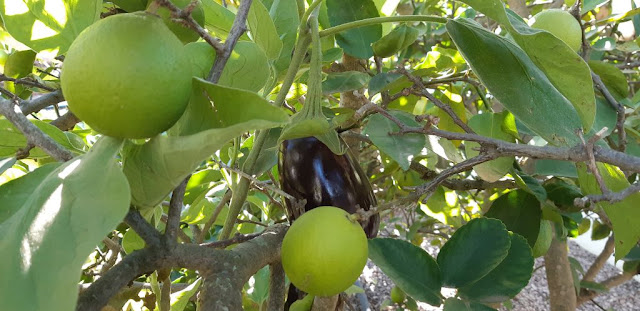Summer lies forgotten on the orchard floor in a carpet of bright yellow leaves. Like bits of sunshine that were too heavy for the sky. On the 21st of June, in the Southern Hemisphere, we celebrated our winter solstice, or the shortest day and longest night of the year.
It is difficult to imagine that after this date, our days will gradually become longer again. Something to look forward to while winter days remain mist-wrapped in the mornings. The mist only dissipates at noon. Then we have a brief bit of sunshine until about 4pm before dusk descends again to wrap the day in a blanket of evening cold.
We have enjoyed intervals of bright sunshiny days. But, they are neither warm nor long enough to ripen the last of the tomatoes. Although there is a good potential harvest of currently unripe beans on the Hereboontjie vines, I do not hold much hope of them ripening before the vines give up. As with the tomatoes, beans need warmer sunshine. The winter sun is simply not strong enough to warm up the garden for the last of the summer vegetables.
When nature decides that it is time for plants to rest, it is best not to ignore the signs. Although it is tempting to see how long one can harvest the summer crop into winter, it is important to give the soil a rest. I finally decided to take out the beans and transfer their trellis to the pea bed, where the peas, which thrive in the cooler weather, were making long vines in need of support.
 |
| The Brinjal plant Competing with the lime tree for some winter sun |
 |
| Turmeric flower, Brinjal Flower and Sweet potatto flower |
The abundant limes herald the citrus season. Food and drink for the season is fragrant with the scent of lime juice, zest, and fruit.
The last of the white and pink guavas, calls for innovative ways to use them, in ways other than the old comfort of stewed guavas in syrup served with custard. A guava and ricotta pasta, made for an exotic side-dish to some fresh Norwegian salmon.
 |
| Guava and Ricotta Linguine |
Sunny days are always welcome after a spell of cold and rain. Brief sunny periods allow us to replenish the wood stock for Towerwater and Elmwood in Woodstock before the next cold front of winter rain sets in again.
 |
| Towerwater Niçoise Salad |
The autumn leaves soon join other material in the compost bins to produce a dark worm-rich compost that will once again feed the garden through summer. With 36 bags of compost waiting at the bottom of the orchard for the big pruning and feeding of the garden in July, summer is never really forgotten.
 |
| Replenishing the wood stock |
Isolation and social distancing have brought us closer to nature and in closer contact with our garden. It has provided welcome therapy in difficult and uncertain times. One more lesson learnt is that if one looks after nature, nature will look after you.










A lovely reflection on the rhythm and routine of country living, thanks.
ReplyDelete